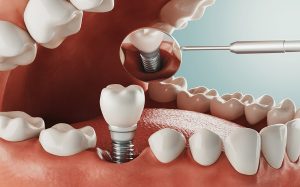We live in a fast-paced world where everything happens quickly. We all want things like fast internet, services that don’t take long, and quick deliveries. This is also true for people who need new teeth after their old ones are taken out. Many patients don’t like the idea of waiting for weeks or months to get their new teeth.
But dentistry, the field of taking care of teeth, including tooth extraction Farmington Hills, has changed to make sure that patients get what they need when they need it. However, this doesn’t mean there aren’t challenges or times when things take longer.
No matter what’s going on, let’s talk about the possibility of getting a new tooth shortly after an old one is removed.
Table of Contents
ToggleWhen Do You Need a Tooth Implant After Teeth Extraction?
- Immediate Placement: In some cases, a dental implant can be placed immediately after a tooth extraction. This approach is suitable when there’s enough bone to support the implant and the surrounding tissues are healthy
.
- Delayed Placement: Waiting for the extraction site to heal is often necessary, especially if there’s a risk of infection or insufficient bone. Typically, this waiting period ranges from a few weeks to a few months.
- Bone Grafting: If the bone in the extraction area is not strong enough to support an implant, a bone graft might be needed. This involves adding bone material to strengthen the site before implant placement.
- Individual Healing: The timeline varies for each person. Factors like overall health, oral hygiene, and bone density influence when an implant can be placed.
- Consultation: Dentist Farmington Hills or oral surgeon will assess your specific situation to determine the best timing for your implant. They will consider your oral health, bone condition, and personal preferences to create a suitable plan.
How Soon After an Extraction Can You Receive an Implant?
After a tooth extraction, it’s generally advisable to wait around 3-6 months for the extraction site to heal before receiving a dental implant. This allows for proper bone recovery and minimizes the risk of implant failure. Your dentist or oral surgeon will provide personalized recommendations based on your specific situation.
Immediate Implant Placement
Immediate implant placement is a dental procedure where an implant is inserted right after a tooth extraction, combining both processes for efficiency. This approach offers the advantage of preserving bone and soft tissue contours in the existing socket. Yet, not all situations allow for immediate placement due to factors such as infection or insufficient bone structure. A comprehensive assessment by a dentist or oral surgeon is essential to determine the feasibility and suitability of this technique for individual cases.
Early Implant Placement
Early implant placement, also known as immediate or post-extraction implant placement, is a dental procedure where an implant is inserted into the jawbone shortly after a tooth extraction. This approach can reduce the overall treatment timeline by combining tooth removal and implant placement. However, it’s crucial to ensure sufficient bone quality and quantity for successful integration. Not all cases are suitable for early placement, as healing and osseointegration must be carefully monitored. Factors such as the patient’s oral health, bone condition, and the location of the implant play a vital role in determining the viability of early implant placement for each individual.
Late Implant Placement
Late implant placement refers to the surgical procedure of inserting dental implants into the jawbone after a considerable period of tooth extraction. This approach allows for proper healing and bone regeneration, enhancing the implant’s stability. Careful assessment of bone density and oral health is essential for successful outcomes in late implant placements.
What Hurts More Tooth Extraction or Implant
The perception of pain can vary between tooth extraction and implant placement. Tooth extraction involves numbing the area and extracting the tooth, often causing pressure sensations but minimal pain. Post-extraction discomfort can occur. Implant placement is usually less painful due to local anesthesia, with mild soreness afterward. However, pain thresholds differ among individuals. Factors like the complexity of the procedure, bone density, and personal pain tolerance play roles. Dentists ensure patient comfort through effective anesthesia and pain management. In both cases, modern techniques and medications have significantly reduced pain, making the experience more manageable.
When Should You Not Get Dental Implants?
- Insufficient Bone Density: Inadequate bone mass may hinder implant stability.
- Young Age: Jawbone growth completion is essential before implants.
- Pregnancy: Hormonal fluctuations can affect implant success.
- Chronic Illness: Conditions like uncontrolled diabetes may impair healing.
- Heavy Smoking: Tobacco use hampers post-surgery healing.
- Gum Disease: Advanced periodontal issues can undermine implant support.
- Certain Medications: Drugs affecting bone health might impact integration.
- Radiation Therapy: Prior head/neck treatments may complicate implantation.
- Substance Abuse: Excessive alcohol/drug use can deter proper healing.
- Unrealistic Expectations: Clear understanding of the procedure and its limitations is crucial.
- Inadequate Oral Hygiene: Implants require rigorous dental care; poor habits pose risks.











